FIDE World Cadet Chess Championships 2025: Registration deadline extended

The organizing committee of the FIDE World Cadet Chess Championships U8, U10, and U12 has announced the extension of the registration deadline to July 13, 2025. The competitions will take place from September 18 (arrival) to October 01, 2025 (departure) in Almaty, Kazakhstan. National Federations can register one official player in each category: under 8, 10, and 12 (Open and Girls). The total of six official players and one head of delegation with a valid FIDE ID from the National Federation are invited by the Organizers. All players must not have reached the age of 8, 10 or 12 in their respective categories before January 1, 2025. Personal rights also are granted to the top 3 players in each category of the last World Cadet Championships (2024), the Continental Cadet Champions of 2024 (1st ranked) and the players placed 1-3 in the 2025 FIDE World Cup for youngsters. National federation may register additional players and accompanying persons and being responsible for all related costs. As part of the event, the World Cadet Chess Solving Championship will be held on September 25, across the same six age and gender categories as the over-the-board competitions. For inquiries, please contact: worldcadet@fide.com The invitation letter with all the details can be found here:calendar.fide.com/event_files/3266/WCCC_2025_Invitation.pdf
Smart Moves Summit 2025: Where chess meets learning

From August 4–5, Alexandria (Washington D.C. area) will host a unique international summit exploring how chess can support cognitive growth, inclusion, and innovation in education. The conference aims to open a dialogue between schools, researchers, EdTech innovators and chess federations on the role chess can play in education and the cognitive development of children. By showcasing research-backed approaches to integrating chess into early and primary education, the conference will challenge conventional thinking about education and development. Organised by the International School Chess Federation in partnership with FIDE, the pioneering international conference brings together leading voices from education ministries, federations, schools, and EdTech – including representatives from more than 20 countries. Speakers include renowned chess educator and journalist Leontxo Garcia, psychologist and chess education expert Jose Francisco Suarez, and John Foley, Director of ChessPlus which creates strategy games for education. “Chess is more than a board game – it’s a powerful educational platform that develops critical thinking, strategical planning and problem-solving skills, which are all essential for the 21st century,” said Dana Reizniece, Deputy Chair of the FIDE Management Board. “We are looking forward to this conference as it will not only bring many of the top experts in the area together to present their research, but it will also be an opportunity to discuss, debate and exchange views and open spaces for new opportunities for chess in education and vice versa,” Reizniece added. What to expect from the event The two-day summit will feature 15 distinct topics, with keynote speakers and presentations focusing on the role of chess in education. On the first day, the conference will focus on the role of chess in early childhood education integration, as well as on the role of strategic leadership in global chess education, and how leveraging technology can create more inclusive learning environments. The first day will also include events on the connection between chess and maths as well as the links between chess and strategy games. One of the panels is dedicated to creating policies aimed at getting more public partnerships for chess programmes. Day two will expand into broader impact areas, exploring commercial opportunities for chess school programs, from marketing to business development. The conference will conclude with a Masterclass by Kenneth Regan, American professor, statistician, and computer scientist. Registration and information The Smart Moves Summit 2025 is aimed at professionals working in the fields of education, educational development and strategy, as well as chess and EdTech tools. The conference will be held at the Episcopal High School 1200 N Quaker Ln, Alexandria, VA 22302. Full programme details and registration information are available at worldschoolteam2025.fide.com/summit/. About the organisers The International School Chess Federation (ISCF) is dedicated to the global promotion and integration of chess within the educational system globally. Launched in September 2024, the ISCF operates as an affiliated body of the International Chess Federation (FIDE). The International Chess Federation (FIDE) is the governing body of the sport of chess, and it regulates all international chess competitions. FIDE was recognised by the International Olympic Committee as a Global Sporting Organization in 1999. Headquartered in Lausanne, FIDE was initially founded in 1924 in Paris under the motto “Gens una Sumus” (Latin for “We are one Family”). It was one of the very first International Sports Federations, alongside the governing bodies of Football, Cricket, Swimming, and Auto Racing. It is now one of the largest, encompassing 201 countries as affiliate members, in the form of National Chess Federations.
FIDE extends sanction against GM Christopher Yoo worldwide
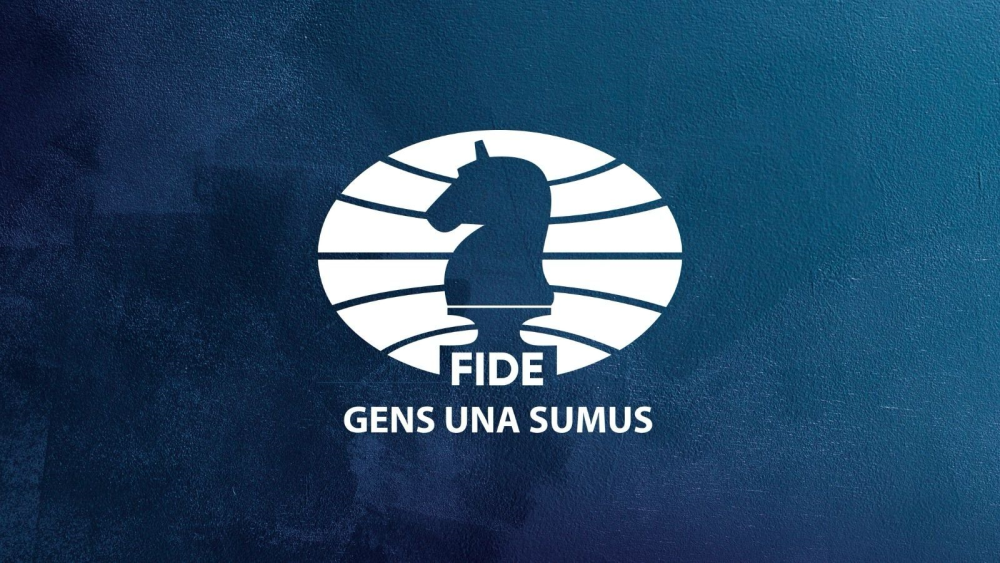
The FIDE Ethics and Disciplinary Commission (EDC) Appeal Chamber has rendered its final decision in Case 05/2025(A), extending the disciplinary sanction imposed by the United States Chess Federation (USCF) against GM Christopher Yoo to a worldwide level. Following a request from the USCF, FIDE has determined that the one-year suspension issued by the USCF – effective from November 15, 2024, to November 14, 2025 – shall now apply globally. During this period, GM Yoo is barred from participating in any FIDE-rated events. This follows a disciplinary process arising from an incident at the US Chess Championship, where GM Yoo physically assaulted a member of the broadcast team. The EDC Appeal Chamber concluded that the USCF’s investigation and sanction were conducted fairly and in line with due process. In addition, GM Yoo will be subject to a five-year probation period through November 14, 2030. Any similar misconduct during this time may lead to further disciplinary action. The full decision can be found here: ethics.fide.com/wp-content/uploads/2025/07/Case_05_2025A_decision_final.pdf
FIDE Women’s World Cup: Everything you need to know!
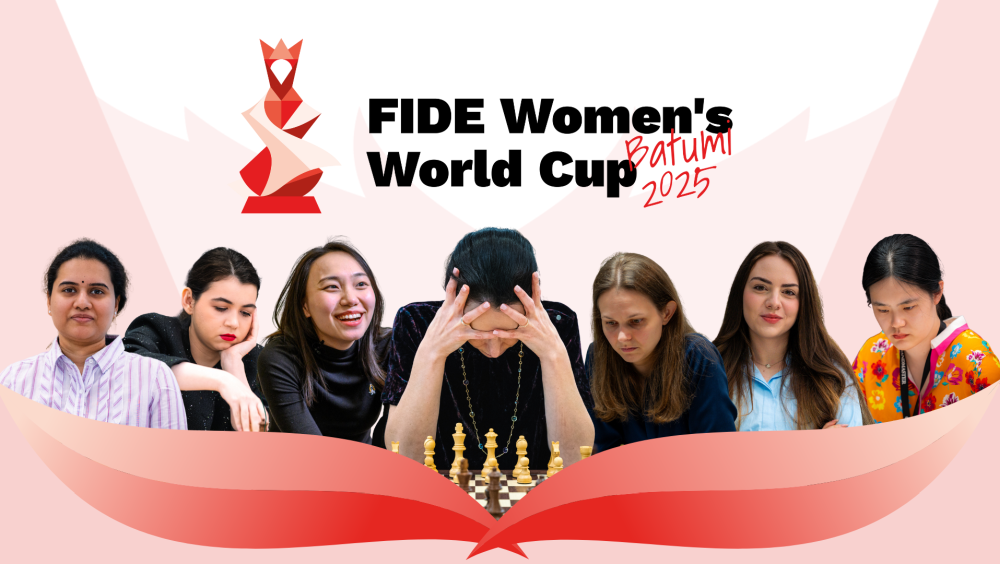
Batumi will host the FIDE Women’s World Cup 2025 from the 5th to the 29th of July. Chess legends, seasoned professionals and emerging talents will play for the $50.000 first prize, in addition to three qualifying spots for the Candidates. Starting next Saturday, July 5th, the 2022 best “secret” European destination and the second most important city in Georgia, will be the venue of the new edition of the FIDE Women’s World Cup, one of the most important tournaments on the international chess calendar. Georgia has a rich history and strong tradition in women’s chess, producing legendary players and consistently achieving high-level results. Home to chess legends like Nona Gaprindashvili, the first woman to be awarded the title of Grandmaster, and Maia Chiburdanidze, who became the youngest Women’s World Champion at the time, Georgia has a proud tradition of women excelling in the game, with a strong national team and international success. Known among many other things for its beautiful Black Sea coastline, Batumi, host of the 2018 Chess Olympiad, will gather the world’s top female chess players in a battle for glory. As FIDE CEO Emil Sutovsky noted, “The Georgian Chess Federation doesn’t just talk about supporting women’s chess – they deliver, time and again. By bringing the FIDE Women’s World Cup to Batumi, they once again demonstrate their deep commitment at the highest level. We are happy to continue this strong cooperation and grateful for their unwavering dedication to our sport.” Located just 3km from the airport, the five-star Grand Bellagio Convention & Casino Hotel will host the competition. The venue is already operating with full force and activity – more than 300 players from nearly 40 countries are currently contesting the FIDE World Cup U-8, U-10, U-12! Structure and prizes: what are they playing for? As if the total prize fund of $691,250 USD, with $50,000 going to the winner, wasn’t enough to whet the players’ appetites, the FIDE World Cup also awards three spots to the FIDE Women’s Candidates Tournament to be held in the first half of 2026, setting the stage for the next World Championship cycle. The knock-out tournament will be played along seven rounds – all rounds shall be played with two classical game matches, plus a tiebreak when necessary. Unlike previous editions, the tournament will not be held in parallel with the FIDE World Cup 2025, scheduled for November. Who to look out for? A total of 107 of the best players in the world, playing from 46 different federations, are set to participate in the event, including seventeen of the current top twenty! Bearing in mind that it’s a knockout tournament and that the twenty strongest players are all situated in a range of barely 100 rating points (it’s anyone’s game!), here are a few picks to watch out for, including seasoned professionals and young prospects! Lei Tingjie (2552), Zhu Jiner (2547) and Tan Zhongyi (2546) – the Chinese squad of GM’s top the first three spots in the starting list, a force to be reckoned with. Any one of them has the strength and experience to go deep in the event. Tan Zhongyi, who previously finished third in Sochi 2021 and fourth in Baku 2023, is excited about the event on and off the board. “Batumi is a beautiful city, and before diving into the hectic World Cup journey, I plan to thoroughly enjoy the local scenery. I’m really looking forward to visiting Batumi!” she shared. Nurgyul Salimova, the 2023 Baku silver medalist, is another rising star to keep an eye on. Reflecting on her journey, she says, “Baku was a big moment for me. Now, I am focused on Batumi and ready for the challenge!” Humpy Koneru – rated 2543, seed number four, she recently took first in the Pune Grand Prix. The Indian team won the 2024 Budapest Olympic gold – will Koneru, Harika, Vaishali or Divya be able to keep up the good form in Batumi? Aleksandra Goryachkina – currently rated 2533, the fourth-highest rated women of all time, will be looking to defend her Baku 2023 title. Alexandra Kosteniuk – rated 2474, Kosteniuk sports an amazing career full of important triumphs, including the Sochi 2021 Women’s World Cup Anna Muzychuk – rated 2535, the older of the two Muzychuk sisters is on a roll in 2025, winning two Women’s Grand Prix events (Austria and Cyprus) in addition to the recent Norway Chess Women’s tournament. “Looking forward to participating in the World Cup in Batumi! I’ve been many times in Georgia – a very hospitable country with rich chess traditions and tasty cuisine,” she said. Carissa Yip – rated 2431, the 21-year-old U.S. number one player has just taken down the 2025 Cairns Cup, completing a GM norm and winning $65,000 USD! Divya Deshmukh – rated 2463, 19-year-old Divya has already won three Olympic gold medals and recently defeated world number one Hou Yifan in the World Rapid Team Championship! Additionally, all the Georgian top contenders – Dzagnidze, Batsiashvili, Arabidze, Javakhishvili and Khotenashvili – will have a serious chance at a deep run. Playing on home turf, they will definitely be cheered on by all the local fans. The full starting rank can be found here Interesting first round clashes 86 of the 107 players will kick off the tournament on round one, while the top 21 main seeds will enjoy a bye, joining the winners directly in the second round. The rating gap between players in the first round is quite large – few serious upsets are to be expected. However, every event produces a few surprises, in which the underdog overpowers the favourite, but it’s very hard to pinpoint on which boards that might happen. Nonetheless, due to the special format of the tournament, the closest first round pairings occur on the last board. Dare I say that most of the upsets will occur on boards 30 to 43. Check out the Round One pairings here How to follow the event?
Rising like queens: A powerful day for girls in Kakuma Refugee Camp
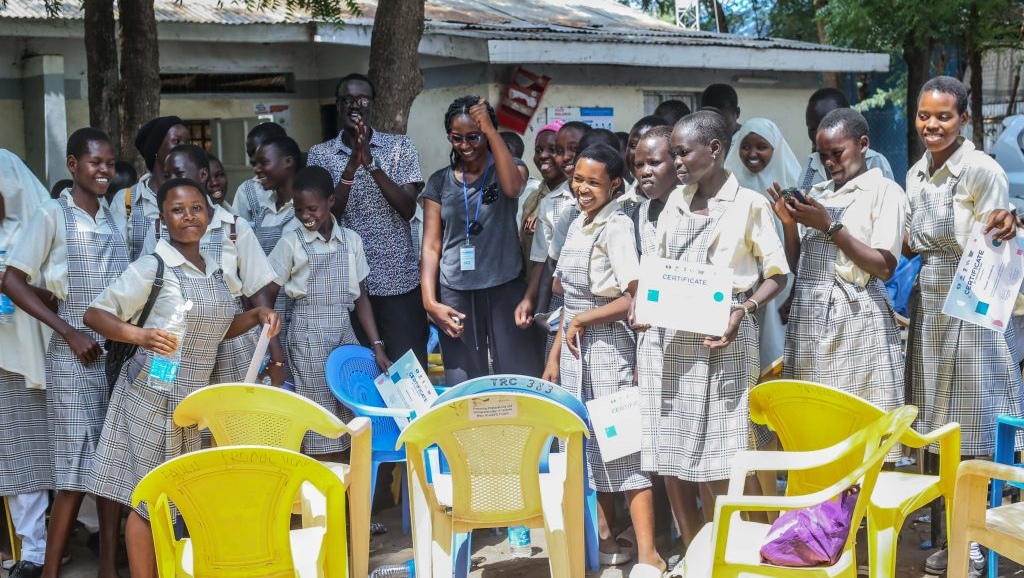
On Saturday, June 28t, something truly extraordinary happened in Kakuma Refugee Camp in Kenya. Over 330 girls gathered for a special on-site chess event! It was a special day – featuring motivational talks and friendly chess matches – transforming what is usually a virtual connection into a vibrant, in-person celebration of empowerment through chess. The event was part of the Girls Club – an initiative of the FIDE Commission for Women’s Chess that offers regular support, training, and empowerment opportunities to girls living in Kakuma Refugee Camp. The Girls Club is part of the broader Chess for Protection project, through which FIDE brings chess to displaced communities. Usually, the Club holds weekly on-line sessions with international coaches WGM Anastasia Karlovich and IM Salome Melia, alongside a local chess tutor. These sessions provide not only chess instruction, but also a much-needed sense of structure, confidence, and global connection. A special day in a unique place Organizing an event in a refugee camp is no simple task. Access, logistics, permissions, communication – each step requires careful planning and strong local partnerships. Yet the impact of showing up in person cannot be overstated. It sends a clear message: We see you. We care. We are ready to do it for you. And the girls responded. Over 330 girls from different schools in the camp took part in Saturday’s celebration – an incredible turnout that deeply moved everyone involved. Inspiration across the board The day’s highlight was a motivational session by Phylis Ngigi, Director of The Gift of Chess, who traveled to Kakuma to deliver her inspiring talk: “Rising Like Queens: Life Lessons Through Chess.” Speaking from personal experience, Phylis used each chess piece as a metaphor for life, weaving powerful lessons into a message of resilience and hope: The Pawn – Small Steps, Big DreamsKeep moving. You can transform your life. The Knight – Be Bold, Think DifferentlyEven when the path is not straight, you can still find your way. The Bishop – Follow Your PurposeStay focused and committed to your journey. The Rook – Build Strength, Stand FirmBe a strong foundation for yourself and others. The Queen – Power and LeadershipYou have the power to lead, protect, and win. Phylis concluded with a message that resonated deeply: “You are part of a global family of thinkers and dreamers.” Generous support and looking ahead Importantly, this growing chess community is now better equipped thanks to generous donations: The Gift of Chess provided 100 chess sets, and DGT contributed 100 digital chess clocks. These will be put to immediate use during the mass tournament taking place the following day, on June 29th, for all refugees that are part of the Chess for Protection program; girls from the Girls Club included. We hope that this is just the beginning. With continued support and opportunities like these, we believe the next Chess Olympiad could feature members of the Refugee Team who took their very first steps here in Kakuma. The Chess for Protection project is made possible thanks to the ongoing collaboration between FIDE and UNHCR, whose shared vision for inclusion and empowerment through chess continues to uplift the incredible people in Kakuma.
FIDE statement on the situation involving GM Kramnik and GM Navara
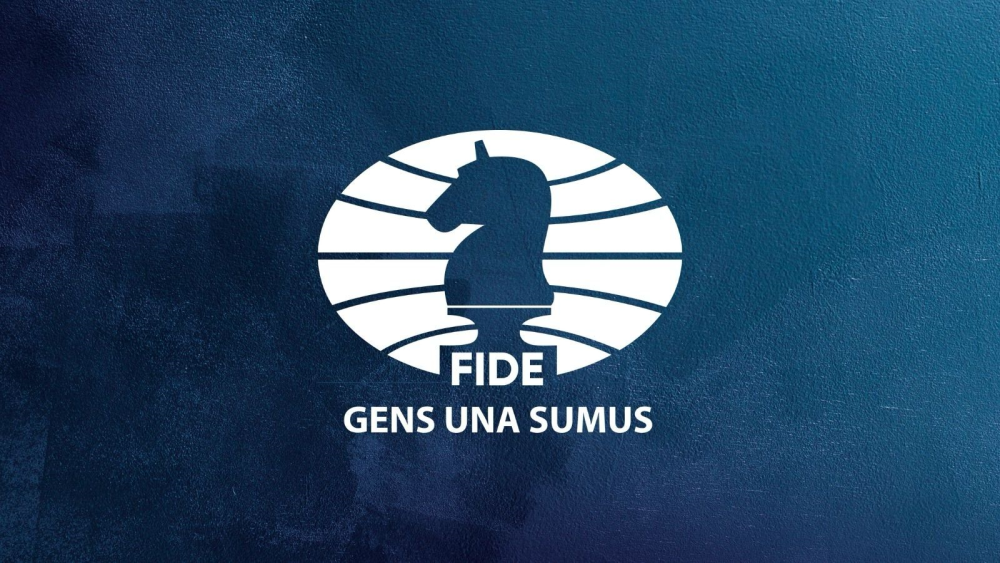
As the world governing body of chess, FIDE takes the issue of fair play – both OTB and online – very seriously, especially considering the current widespread popularity of online platforms and their impact on the growth and development of the game worldwide. In this regard, the methods publicly proposed by GM Vladimir Kramnik deserve careful review and assessment for practical applicability. FIDE will establish a dedicated task force to evaluate these methods and invites GM Kramnik to present the details of his approach and statistical data for an official FIDE evaluation. At the same time, we are gravely concerned that the way Mr. Kramnik presents his points brings a lot of harm to the chess community. Mr. Kramnik must recognize, that it is not just his opinion or questions – it is a very clear narrative, and coming from the former World Champion it could be ruinous for the careers and a very well-being of certain players. The current discourse has significantly affected such a respected member of the chess community as GM David Navara and has now led to a defamation lawsuit being filed by GM Kramnik against GM Navara. We wish to emphasize once again that throughout his chess career, GM Navara has earned an unquestionable reputation as a paragon of a fair play. The chess community is well aware that David is a person of a great sensitivity and integrity, particularly vulnerable to any implication of unfair play. Without entering into legal or stylistic analyses of the statements made, we believe that – above all – mutual respect and empathy among colleagues must take precedence. We are firmly convinced that the lawsuit against GM Navara should be withdrawn as soon as possible in the interest of the entire chess community. We sincerely hope that GM Kramnik will take this morally justified step, which we believe will be welcomed by the broader chess world. FIDE Management Board
FIDE World Cup Under 8-12: Leaders emerge after Round 6
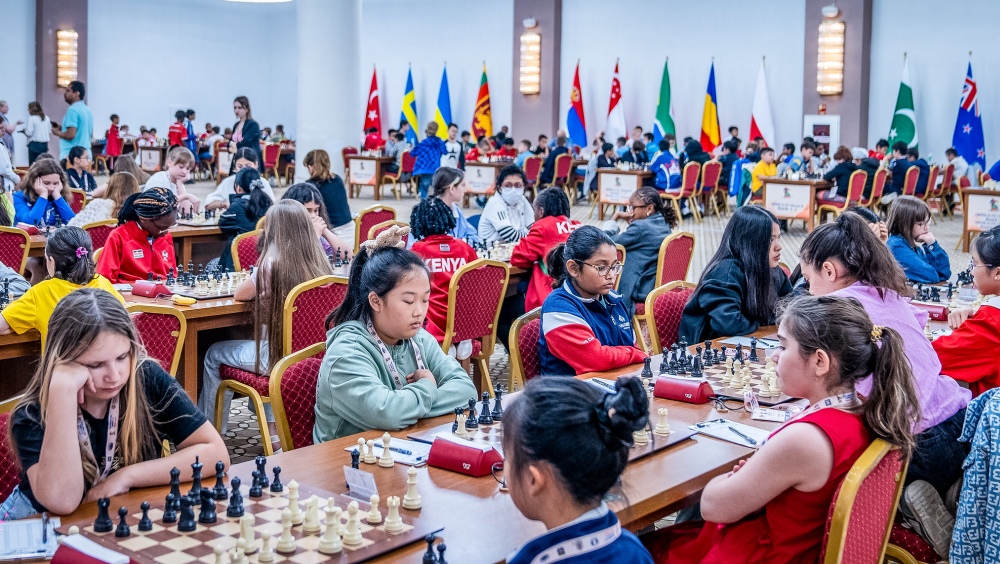
The FIDE World Cup Under 8–12 in Batumi has passed its midpoint. After six exciting rounds, sole leaders have emerged in all groups except for Open 10 Group B, Open 12 Group B, Girls 10 Group A, and Girls 12 Group A. All games begin daily at 13:00 CET and are broadcast live. The tournament is conducted in full compliance with anti-cheating regulations, with all players thoroughly checked before entering the playing hall. “The FIDE World Cup U8, U10, and U12 is being held in Batumi for the second time. This edition has brought together 300 participants from nearly 40 countries. As organizers, we are doing our best to ensure the tournament is conducted at the highest level, with attention to every detail,” said Akaki Iashvili, Tournament Director and FIDE Director for Special Tasks (pictured above, right). “Right after the conclusion of this World Cup, Batumi will also host another major chess tournament — the FIDE Women’s World Cup 2025. So, we’re just at the beginning of a long and exciting chess marathon in Georgia,” he added. On the rest day, June 30, two additional events are scheduled: the blitz tournament “Nesis Cup 2025” for official delegation coaches, and the Chess Solving World Cup for boys and girls under 8, 10, and 12. Current leaders after Round 6: Open 08 – Group AJevglevski, Lev (EST) – 5/6 Open 08 – Group BDede, Omer Taha (TUR) – 5/6 Girls 08 – Group AVolkova, Varvara (FIDE) – 6/6 Girls 08 – Group BBissaliyeva, Alisha (KAZ) – 5.5/6 Open 10 – Group AMani, Sarbartho (IND) – 5.5/6 Open 10 – Group BAarit, Kapil (IND) – 5/6Oishik, Mondal (IND) – 5/6 Girls 10 – Group AGao, Ruoya (CHN) – 5/6Chen, Zhihan (CHN) – 5/6 Girls 10 – Group BDivi, Bijesh (IND) – 6/6 Open 12 – Group ASameh Mohamed, Abdalrahman (EGY) – 5.5/6 Open 12 – Group BLing, Chenxuan (USA) – 5.5/6Bulgak, Damir (FID) – 5.5/6 Girls 12 – Group ATselmuun, Ider (MGL) – 5/6Aadya, Gowda (IND) – 5/6Xue, Tianhao (CHN) 5/6 Girls 12 – Group BPratitee, Bordoloi (IND) – 5.5/6 Voices from the tournament Cael Lelethu Stander from South Africa (pictured above), playing in the group B of the Open U10 category, shared his impressions on the event: “I have stated playing chess because my mom taught me how to play. I have found the game really fun. I have started watching videos about tactics and strategy. The most exciting this about this event is that here I have a chance to play against people from all around the world, which I haven’t been able to do yet.” Marta Dograshvili from Georgia (group B, girls U12) also told her story: “I have learnt chess because my sister was playing it, but she is not playing anymore. In this tournament, I am playing with a lot of strong players, but this is not unique to Georgia. Still, this is my first time I am playing blitz and rapid. Chess is very good for my studies, as it helps me very much with math and English.” Round 7 pairings: chess-results.com/tnr1205199.aspx?lan=1&art=2&rd=5&flag=30 Live broadcast: chess.com/events/2025-fide-youth-world-cup-g8a/games Official website: https://wcc2025.fide.com/
Praggnanandhaa R wins UzChess Cup 2025 Masters
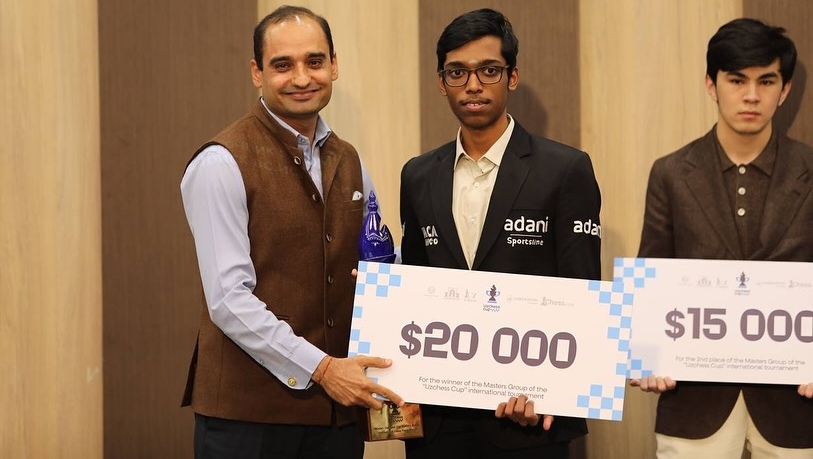
Rameshbabu Praggnanandhaa emerged as the winner of the UzChess Cup 2025, edging out Javokhir Sindarov and Nodirbek Abdusattorov in a thrilling tiebreaker. The Indian GM took home the $20,000 first prize and extended his lead in the FIDE Circuit 2025 standings. The second edition of the UzChess Cup took place at the “Panaram’s” Hotel in Tashkent. The total prize fund amounted to $121,500, with $80,000 allocated to the “Masters” group, $25,000 to the “Challengers,” $11,500 to the “Futures,” and $5,000 to the “Open” group. The Masters tournament was fiercely contested, with all players showing exceptional fighting spirit—none of them finished the event undefeated. Praggnanandhaa and Abdusattorov started strong, tying for the lead after Round 4 with 3/4. However, in the next round, the Indian GM lost to Parham Maghsoodloo, while the Uzbek star defeated Chithambaram Aravindh and pulled ahead. Praggnanandhaa then suffered another loss in the following round, seemingly falling out of title contention. Despite a loss to his compatriot Nodirbek Yakubboev in Round 6, Abdusattorov entered the final ninth round as the sole leader on 5.5/8, half a point ahead of Sindarov and a full point ahead of Praggnanandhaa and Arjun Erigaisi. In the decisive final-round game—and arguably the game of the tournament—Praggnanandhaa rose to the occasion and outplayed the leader with the black pieces in a Sicilian Defense to catch up. Meanwhile, Sindarov drew with Maghsoodloo, and Erigaisi, despite holding a significant advantage at some point, only managed a draw against Aravindh. As a result, Praggnanandhaa, Abdusattorov, and Sindarov all finished with 5.5/9. To determine the champion, a tiebreaker in the form of a double round-robin with fast time control was played. In a dramatic twist, all three players finished with 2/4—forcing another tie. A second tiebreaker, this time a single round-robin, followed. Praggnanandhaa scored 1.5 points to clinch the title. Sindarov, who defeated Abdusattorov but lost to the eventual winner, finished second. Final standings — UzChess Cup Masters 1 Praggnanandhaa, R 2767 IND 5½ 2 Sindarov, Javokhir 2767 UZB 5½ 3 Abdusattorov, Nodirbek 2710 UZB 5½ 4 Erigaisi, Arjun 2782 IND 5 5 Maghsoodloo, Parham 2691 IRI 4½ 6 Rapport, Richard 2714 HUN 4½ 7 Yakubboev, Nodirbek 2659 UZB 4½ 8 Vokhidov, Shamsiddin 2644 UZB 4 9 Nepomniachtchi, Ian 2757 FID 3½ 10 Aravindh, Chithambaram 2749 IND 2½ In the other sections, GM Nikolas Theodorou (pictured above, right) of Greece won the Challengers event, GM Saparmyrat Atabayev of Turkmenistan came out on top in the Futures tournament, while local player Bekhruz Umarov triumphed in the Open competition. Final standings: Challengers, Futures, Open Photos: UzChess and ChessBase India
Celebrating International Chess Day 2025: Every Move Counts
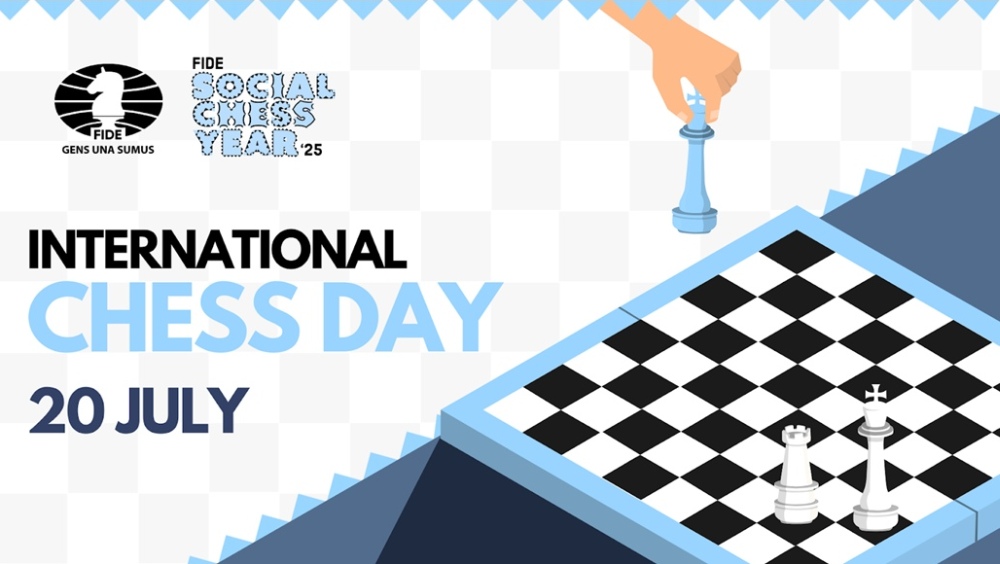
Each year on July 20, the global chess community unites to celebrate International Chess Day, commemorating the founding of FIDE in 1924. Last year marked a historic milestone – FIDE’s centennial anniversary, which celebrated a century of chess while laying the foundation for the next hundred years. Among the key legacies of that celebration is FIDE’s renewed commitment to long-term goals: from global expansion and accessibility to deepening chess’s social impact. This year, FIDE launched the Year of Social Chess, an initiative dedicated to using the game as a tool for inclusion, education, empowerment, and mental well-being. The theme for International Chess Day 2025, “Every Move Counts”, reminds us that, on the board and in life, every decision shapes our journey. In 2024, to commemorate the centenary, the global chess community set a Guinness World Record for the most chess games played in 24 hours: over 7.28 million games played across more than 350 events worldwide. In 2025, we aim to carry this momentum forward with global celebrations, inclusive events, and creative storytelling that highlights the power of chess to bring people together. Creative Chess FIDE invites chess lovers everywhere to join us in promoting the game in the most imaginative way possible. It’s time to play Creative Chess. Set up a game in the most unusual or symbolic place you can think of: a mountaintop, underwater, at your local landmark, or any wild and creative place that you can imagine. Host your game or tournament anytime between July 10 and 20, and share your photos or videos using #InternationalChessDay or send them to socialmedia@fide.com. Your content could be seen across the globe and featured on FIDE’s social media channels and during our YouTube broadcast on July 20. Let’s show the world how vibrant, fun, and limitless chess can be. Global Online Celebration in Partnership with Lichess.org Join us for the largest-ever Social Chess Day tournament, co-hosted by FIDE and Lichess.org. This 24-hour online blitz tournament will have a time control of 5+3 and begins at 00:00 CEST (Zurich time) on July 20, running until 00:00 CEST on July 21. Players of all levels are invited to participate – no matter the time zone, and can join at any time, playing as many games as they want! All participants will be entered into random prize draws, with rewards including: 5 winners will receive a voucher to attend the Opening Ceremony and the first round of the World Chess Olympiad 2026 in Samarkand, Uzbekistan (including two nights of hotel accommodation). At least 10 winners will receive a gift voucher for FIDE merchandise valued at €100, redeemable at the official online shop: shop.fide.com At least 20 winners will receive a copy of the exclusive chess photography book “Chess Players.” At least 40 winners will receive access to a group or individual online masterclass with a top Grandmaster (date and GM to be announced). 20 winners will be invited to take part in a top-GM online simul on Lichess (details to be confirmed) You can join the event via the following link: lichess.org/tournament/fscday25 Regulations for FIDE Social Chess Day Tournament (PDF) Global Over-the-Board Events We warmly encourage federations to organise an inclusive, over-the-board chess event on July 20th. This could involve diverse communities, such as seniors, refugees, youth from underserved areas, or individuals with disabilities — showcasing how chess transcends barriers and builds connection. Such events showcase how chess transcends barriers and connects people across backgrounds. Please share your stories and photos on social media by tagging FIDE and FIDE Social Commission and by using the hashtags: #FIDESocialChess, #FIDESocialChessAward, #SocialChess, #SocialChessDay “Teach Someone to Play Chess” Initiative One of the simplest yet most powerful ways to celebrate International Chess Day is by teaching someone to play. Whether it’s a friend, a sibling, a neighbor, or a colleague — pass on the gift of chess. Your act could spark a lifelong journey. Let’s Make Every Move Count Whether you teach one person to play, host a community tournament, or share your chess story with the world – your participation matters. Together, let’s celebrate the transformative power of chess on International Chess Day 2025.
FIDE World Cup U-8, U-10, U-12 kicks off in Batumi, Georgia
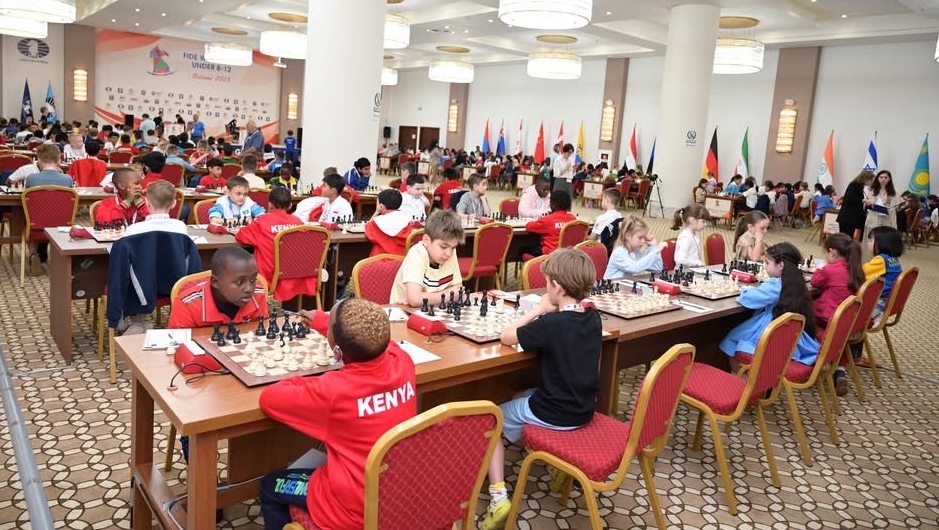
The FIDE World Cup for boys and girls in the U-8, U-10, and U-12 categories began on June 23 in Batumi, Georgia, with a brief opening ceremony. Notably, this is the second time the city of Batumi is hosting the event. The competition is being held at the 5-star Grand Bellagio hotel, with around 300 players from nearly 40 countries participating. The number of players in each category is determined by FIDE quotas in accordance with tournament regulations. Games begin daily at 13:00 CET, while the final round will start at 10:00 on July 2. All games are being broadcast live. The opening ceremony was attended by several distinguished guests, including FIDE Director of Special Tasks and President of the Georgian Chess Federation Akaki Iashvili, Acting Mayor of Batumi Giorgi Murvanidze, Deputy Minister of Education and Sport of Adjara Irakli Abuladze, Head of the Sports Department Irma Nizharadze, Head of the Appeals Committee Ozgur Solakoglu, and President of the Adjara Chess Federation WGM Salome Melia. Round 2 pairings: chess-results.com/tnr1205196.aspx?lan=1&art=2&rd=2&flag=30 Live broadcast: chess.com/events/2025-fide-youth-world-cup-g8a/games Official website: wcc2025.fide.com/

